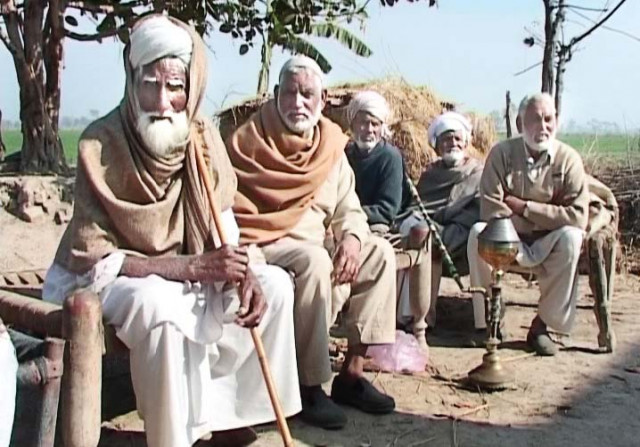.
ISLAMABAD:
The Supreme Court has directed provincial governments to take concrete measures for the welfare and protection of senior citizens, underscoring the constitutional obligation to protect family life, dignity and social security.
In a nine-page judgment written by Justice Salahuddin Panwar, the Supreme Court directed the Sindh government to establish and ensure effective functioning of protection committees in each district within ninety days as required under Section 19 of the Sindh Domestic Violence (Prevention and Protection) Act, 2013.
The court also directed the Punjab government’s law and parliamentary affairs department to review this matter, take necessary steps and introduce a welfare code for senior citizens, which includes a council fund and a simple maintenance court.
The verdict was handed down during the hearing of a property dispute between a father and his children.
According to the case record, the complainant – a retired doctor and senior citizen – claimed that his two adult children, a daughter and a son from a dissolved marriage, had illegally deprived him of his house at 24-B, Sunset Boulevard, DHA Phase-II Extension, Karachi.
He maintained that though he had provided financial support for the petitioners’ education both in Pakistan and abroad, they eventually became violent against him and forced him out of his own residence.
The father filed a complaint with the Karachi South Additional Sessions Judge under Section 3 of the Illegal Dispossession Act, 2005, after which arrest warrants were issued against his children. The petitioners challenged the order in the Sindh High Court (SHC), which rejected their plea, prompting them to approach the SC.
A three-judge bench headed by Justice Muhammad Hashim Khan Kakar framed the question as to whether “a complaint under Section 3 of the Act, 2005 is maintainable in a familial, permissive possession setting between a father and his adult children, absent clear material indicating that the human rea is to deprive, seize or unlawfully occupy”.
The judgment noted that the Act was a “special penal law intended to protect lawful owners and occupiers from forcible eviction and seizure of land by unauthorized persons”.
It clarified that its application was not limited to so-called “qabza groups or land mafias” but extended to any person who forcibly enters or controls another’s property “with the intent to deprive, seize, control or occupy”.
The ruling emphasized that Pakistan’s constitutional framework “places the family at the heart of social life,” with Articles 9 and 14 guaranteeing personal security and dignity, Article 31 obliging the state to enable Muslims to live according to Islamic injunctions, and Article 35 mandating protection of the family, the mother and the child.
“In our collective, not individualistic, social structure, the home is a place of mutual care, interdependence and trust,” the judgment said, adding that “Islamic law and ethics assign parents and the elderly the highest status and enjoin upon them kindness, respect and service. Criminal law must therefore be used to deter abuse within family associations or crime within crime.”
The court warned that “implementing the IDA 2005 in a permissive trust household composition risks overcriminalization and distorts the statute beyond its text, purpose, and spirit”.
It also referred to the Sindh Domestic Violence (Prevention and Protection) Act, 2013, noting that it defines an aggrieved person broadly and ensures, through Section 9, the right of residence of women, children or other vulnerable persons in a joint household.
“Section 19 mandates district-level protection committees with multidisciplinary membership, including psychology and social welfare expertise,” the judgment observed, adding that “the implementation of Section 19 of the Sindh Domestic Violence (Prevention and Protection) Act, 2013 remains uneven.”
The judgment reiterated that “the Government of Sindh must ensure that the Protection Committees are fully constituted and functional in all districts, with psychologists and psychosocial workers included, and that their referral pathways are activated so that families are supported and vulnerable persons are protected without resorting to overly broad criminal process”.
It further noted that while the Islamabad Capital Territory Senior Citizens Act, 2021 exists, “provinces bear the primary responsibility for social protection”.
“Domestic violence frameworks are uneven in their protection of vulnerable persons,” the judgment continued, explaining that Sindh and Balochistan define “aggrieved persons” broadly to include any vulnerable person, while Punjab and Khyber Pakhtunkhwa limit protection largely to women.
“Sindh and Khyber-Pakhtunkhwa have long passed statutes for senior citizens and Balochistan has followed suit, while Punjab has so far only introduced a senior citizen welfare bill,” the judgment said.
“These variances lead to protections that revolve around geography rather than need and invite principled harmonization that respects provincial autonomy but ensures a basic dignity for the elderly and other dependents.”
The court said it was “constitutionally appropriate and administratively imperative” for the Punjab government to consider two complementary approaches – “firstly, to extend the definition of aggrieved person in its domestic violence legislation to include any vulnerable person, thereby allowing prompt civil protection relief for dependent elderly within the domestic sphere; and secondly, the proposed Puns Welfarb Legislation, 2025, an Act of Rights and provision that creates a dedicated council, a modest welfare fund and a simple, summary court for parental maintenance and care.”
The judgment further stated that such legislation should “provide notice-based, conciliatory procedures, calibrated orders for residence, maintenance and care plans, prompt enforcement and penalties that are civil in the first instance, subject to a criminal penalty for casual non-compliance”.
“This approach would be consistent with Articles 9, 14, 31 and 35 of the Constitution and with our collective ethos that honors parents and protects family life,” the court added.
Copies of the judgment were ordered to be sent to the law departments of Balochistan and Khyber Pakhtunkhwa through their chief secretaries and advocates general “for information and similar action they may deem fit”.



